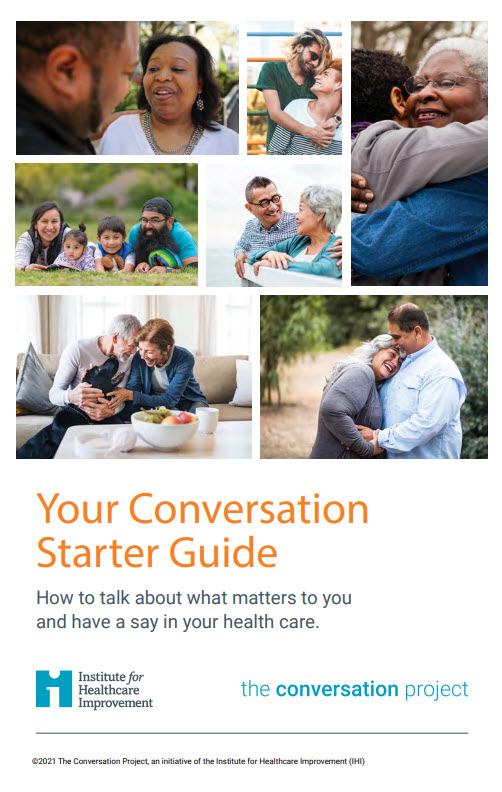Advance Care Planning
Your care, your way.
Advance care planning is a way for you to ensure your wishes and goals are known for the types of care you expect to have at the end of your life.
Planning means having in-depth talks with doctors, family and close friends; making thoughtful choices; and creating advance directives. Doing this helps you keep control over your health care decisions if you become seriously ill and unable to communicate.
Start the conversation

Visit theconversationproject.org for more information or to download these tools.
For more detailed information, scroll down this page.
Watch the Advance Care Planning Video
What are advance directives?
Advance directives are documents designed to ensure that your decisions about your medical care, including your right to refuse treatment, are understood and followed by your health care providers if you become physically or mentally unable to make decisions on your own. These documents are an important guide for your doctors, as well as your family, who may play an important role in working with your doctors on your future care.
Am I required to have advance directives?
Although you are not required to have advance directives, it’s important that you do. Even if you are in good health, it’s still important to make your wishes known, and it’s never too early to do so. Both state and federal law require health care institutions and physicians to respect the wishes of patients over age 18 concerning medical care.
What happens if I don’t have advance directives?
If you don’t have advance directives and you become ill and unable to make health care decisions on your own, neither your family nor your health care providers will know your preferences for treatment and care. They will make decisions for you, and there is a chance that their decisions will not be what you would have chosen for yourself.
How do I start advance care planning?
Advance care planning means talking with the people closest to you—including your doctors, advisors and loved ones—about your wishes and goals for nearing the end of life. You should talk to your family, close friends, doctor and attorney before deciding on advance directives. When you are ready to begin planning, there are many helpful tools available. See the Resources to Help You Start Planning section below.
Who do I give my advance directives to?
It’s important to give a copy of your advance directives to your main doctors, to trusted family and friends, and to Peoples Health. Because you share your advance directives with these key contacts, if you change your advance directives, it’s also important to give them updated copies. When you share your advance directives with Peoples Health, we make sure all the health care providers you have a relationship with have access to your advance directives if needed.
Advance directives can help you convey your desires and identify:
- Who should make health care decisions for you when you cannot
- The kind of treatment you want or don’t want (your living will)
- How comfortable you want to be (in managing pain)
You can download the Louisiana Advance Directives booklet using the link below. The booklet includes a living will document.
Louisiana Advance Directives
Download PDF
The law also allows you to designate a health care power of attorney to make decisions about your medical care and treatment if you are physically or mentally unable to do so. You may need to speak with an attorney for advice on creating a health care power of attorney to suit your needs.
For more information, contact customer service.
Resources to Help You Start Planning
Advance care planning takes careful thought and preparation. Read this article on the Connection blog that may be helpful. Below are some other tools to get you started:
- To help gather your thoughts before having advance care planning talks, check out Your Conversation Starter Guide. It’s a tool that the Institute for Healthcare Improvement developed. It includes questions you can answer to help organize your thoughts. There is also a resource called Guide for Talking with a Health Care Team that can help you have conversations with your health care providers. Visit theconversationproject.org for more information or to download these tools.
- To help define and document your wishes, check out begintheconversation.org. Here you can find a workbook to guide you through seven advance care planning steps—begin, educate, prepare, communicate, document, act and empower. Visit the website for more information or to download a sample of the workbook.
- For additional articles geared toward you and your family, visit Next Avenue at nextavenue.org/category/end-of-life-care.
- Watch the Advance Care Planning video.
